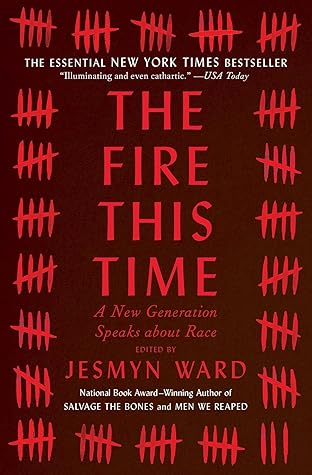More on this book
Community
Kindle Notes & Highlights
by
Jesmyn Ward
Read between
January 18 - January 22, 2017
Replace ropes with bullets. Hound dogs with German shepherds. A gray uniform with a bulletproof vest. Nothing is new.
I believe there is power in words, power in asserting our existence, our experience, our lives, through words. That sharing our stories confirms our humanity. That it creates community, both within our own community and beyond it.
What Baldwin understood is that to be black in America is to have the demand for dignity be at absolute odds with the national anthem.
Europe is no longer a frame of reference, a standard-bearer, the classic model for literature and for civilization. It’s not the measuring stick. There are other standards in the world.”
This misperception, he pushed, is because people don’t want to remember the dehumanization. Without hesitating, he went on to say, Slavery is violent, grotesque, vulgar, and we are all implicated in how it denigrates humanity.
Wheatley is much more than that. She proved something to white people about us: that we could read and think and write—and damn it, we could feel, no matter what the racists believed.
Protests and looting naturally capture attention. But the real rage smolders in meetings where officials redraw precincts to dilute African American voting strength or seek to slash the government payrolls that have long served as sources of black employment. It goes virtually unnoticed, however, because white rage doesn’t have to take to the streets and face rubber bullets to be heard.
Supreme Court’s 1876 United States v. Cruikshank decision, which undercut a law aimed at stopping the terror of the Ku Klux Klan.
A rash of voter-suppression legislation, a series of unfathomable Supreme Court decisions, the rise of stand-your-ground laws, and continuing police brutality make clear that Obama’s election and reelection have unleashed yet another wave of fear and anger.
As Reagan’s key political strategist, Lee Atwater, explained in a 1981 interview: “You start out in 1954 by saying, ‘N——-, n——-, n——-.’ By 1968 you can’t say ‘n——-’—that hurts you. Backfires. So you say stuff like ‘forced busing,’ ‘states’ rights,’ and all that stuff. You’re getting so abstract now you’re talking about cutting taxes, and all these things you’re talking about are totally economic things, and a byproduct of them is blacks get hurt worse than whites. And subconsciously maybe that is part of it. I’m not saying that.”
Shelby County v. Holder, which gutted the Voting Rights Act and opened the door to twenty-first-century versions of nineteenth-century literacy tests and poll taxes.
assault on so-called Big Government, which despite the sanitized language of fiscal responsibility constitutes an attack on African American jobs. Public-sector employment, where there is less discrimination in hiring and pay, has traditionally been an important venue for creating a black middle class.
Remember a Florida judge instructing a jury to focus only on the moment when George Zimmerman and Trayvon Martin interacted, thus transforming a seventeen-year-old, unarmed kid into a big, scary black guy, while the grown man who stalked him through the neighborhood with a loaded gun becomes a victim.
Being black is not a feeling. I don’t always feel colored. Nor is it simply a state of mind. Blackness: a way of being.
It’s dealing with blackness that black people have perfected—or at least gotten practiced at. Racism’s daily injustices are almost an inoculation against it. Almost.
This stank wasn’t that stink. This stank was root and residue of black Southern poverty, and devalued black Southern labor, black Southern excellence, black Southern imagination, and black Southern woman magic. This was the stank from whence black Southern life, love, and labor came.
Walking while black restricts the experience of walking, renders inaccessible the classic Romantic experience of walking alone.
In the words of the playwright Lorraine Hansberry, “The problem is we have to find some way with these dialogues to show and to encourage the white liberal to stop being a liberal and become an American radical.”
Michael Brown’s mother, Lesley McSpadden, was kept away from her son’s body because it was evidence. She was denied the rights of a mother, a sad fact reminiscent of pre–Civil War times, when as a slave she would have had no legal claim to her offspring.
A sustained state of national mourning for black lives is called for in order to point to the undeniability of their devaluation. The hope is that recognition will break a momentum that laws haven’t altered.
From the time your children begin walking, they are moving away from you. This is as it should be, even when you can’t protect them from harm with anything but the inadequate outerwear of your love.
In his own version of “The Talk,” James Baldwin wrote to his nephew James in “My Dungeon Shook,” “You were born in a society which spelled out with brutal clarity, and in as many ways as possible that you were a worthless human being.”


